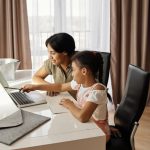Understanding the Purpose of Parental Control Shows
Parental control shows have gained significant popularity in recent years, aiming to provide guidance and oversight for children’s media consumption. These shows are designed to assist parents in managing their children’s exposure to potentially harmful content and ensuring age-appropriate viewing. By offering practical tips, educational information, and real-life examples, these programs aim to empower parents with the necessary tools to protect their children from inappropriate material.
One of the primary purposes of parental control shows is to educate parents about the potential risks associated with unrestricted access to media. These shows often highlight the negative effects that excessive screen time or exposure to violent or explicit content can have on a child’s behavior and development. By raising awareness among parents, these programs help them make informed decisions regarding what their children should watch and how much time they should spend engaging with different forms of media.
Furthermore, parental control shows also serve as a platform for sharing effective strategies and techniques that parents can employ when implementing restrictions on their child’s media consumption. From setting up age-appropriate filters on devices to monitoring online activities closely, these programs provide practical advice tailored specifically for concerned parents. Additionally, many parental control shows invite experts in child psychology or digital media literacy who offer valuable insights into understanding the impact of various types of content on young minds.
By providing vital information and guidance through informative episodes or expert interviews, parental control shows play a crucial role in equipping caregivers with knowledge about responsible parenting in today’s digital age. They empower parents by highlighting potential dangers while also offering solutions for maintaining a healthy balance between technology use and other aspects of a child’s life. Ultimately, understanding the purpose behind these shows helps us recognize their significance in assisting families navigate the complex landscape of modern media consumption effectively.
The Impact of Parental Control Shows on Children’s Behavior
Parental control shows have become increasingly popular in recent years, aiming to educate parents on how to monitor and regulate their children’s media consumption. However, the impact of these shows on children’s behavior is a topic of concern. Research suggests that while parental control shows can be informative and helpful for parents, they may also have unintended consequences on children.
Firstly, studies have shown that excessive exposure to parental control shows can lead to increased anxiety and fear among children. These programs often depict potential dangers and risks associated with various forms of media, which may instill a sense of fear in young viewers. This heightened anxiety can result in children becoming more hesitant or fearful when it comes to exploring new content or engaging with technology independently.
Furthermore, some experts argue that parental control shows may inadvertently promote an over-reliance on external regulation rather than fostering internal self-regulation skills in children. By constantly emphasizing the need for strict monitoring and restrictions, these programs may hinder the development of critical thinking and decision-making abilities among young viewers. As a result, children may struggle to make responsible choices regarding their media consumption without constant supervision from their parents.
In light of these concerns, it is essential for parents to strike a balance between implementing effective parental control measures and allowing their children room for autonomy and independence. While parental guidance plays a crucial role in managing media consumption, it is equally important for parents to encourage open communication with their children about the content they consume. This approach fosters trust between parent and child while promoting healthy decision-making skills based on mutual understanding rather than solely relying on external controls imposed by parental control measures or television programs.
By considering both the benefits and potential drawbacks associated with parental control shows’ influence on behavior, parents can make informed decisions about how best to manage their child’s media consumption without compromising their emotional well-being or hindering their overall development.
Analyzing the Effectiveness of Different Parental Control Measures
One of the most common parental control measures is content filtering, which involves blocking or restricting access to certain websites, apps, or online content. This can be effective in preventing children from accessing inappropriate or harmful material. However, its effectiveness largely depends on the accuracy and reliability of the filtering software used. Some filters may not accurately categorize content, leading to false positives or negatives. Additionally, determined children may find ways to bypass these filters through various means such as using proxy servers.
Another popular measure is time restrictions, where parents set limits on how much time their children can spend using electronic devices or accessing specific types of media. This can help prevent excessive screen time and promote a healthier balance between online activities and other important aspects of life such as schoolwork and physical exercise. However, it is important for parents to communicate and enforce these restrictions consistently for them to be truly effective.
Monitoring tools are also commonly used by parents to keep track of their child’s online activities. These tools allow parents to view their child’s browsing history, social media interactions, and even text messages. While this measure can provide valuable insights into a child’s digital behavior and potential risks they might encounter online, it raises concerns about privacy invasion and trust within the parent-child relationship. It is crucial for parents to strike a balance between monitoring their child’s safety while respecting their privacy rights.
By implementing different parental control measures such as content filtering, time restrictions, and monitoring tools; parents aim to protect their children from potentially harmful influences in today’s digital age. However it should be acknowledged that no single approach will guarantee complete protection nor should they replace open communication with children regarding responsible internet use.
Exploring the Role of Parental Guidance in Managing Children’s Media Consumption
Parents play a crucial role in managing their children’s media consumption. By providing guidance and setting appropriate boundaries, parents can help their children make informed choices about the content they consume. One important aspect of parental guidance is establishing clear rules and expectations regarding media use. This includes determining the amount of time children are allowed to spend on screens, as well as the types of content that are suitable for their age and development.
In addition to setting limits, parents should also actively engage with their children when it comes to media consumption. This means discussing the content they watch or interact with, asking questions about what they find interesting or confusing, and encouraging critical thinking skills. By having open conversations about media, parents can help their children develop a better understanding of how different forms of entertainment influence their thoughts and behaviors.
Furthermore, parental guidance should extend beyond simply monitoring screen time. It involves being aware of what platforms or apps your child is using, who they are interacting with online, and ensuring that privacy settings are properly set up to protect them from potential risks. Additionally, staying updated on current trends in technology and social media can enable parents to have more meaningful discussions with their children about online safety and responsible digital citizenship.
By taking an active role in managing their children’s media consumption through guidance and communication, parents can foster healthy habits while also promoting critical thinking skills necessary for navigating today’s digital landscape. The responsibility lies not only in limiting exposure to inappropriate content but also in empowering children to make informed decisions about what they consume online
The Psychology Behind Parental Control Shows: How They Influence Decision-making
One aspect of the psychology behind parental control shows is their influence on decision-making processes in children. Research has shown that exposure to these shows can shape how children make choices and evaluate potential consequences. For instance, when children see characters facing dilemmas and making decisions based on moral values or problem-solving skills, they are more likely to incorporate those behaviors into their own decision-making process.
Additionally, parental control shows often depict characters dealing with various challenges and conflicts. This exposure allows children to observe different strategies for resolving problems and making decisions effectively. By watching these shows, children may develop a broader range of problem-solving techniques and learn how to weigh different options before coming to a conclusion.
Furthermore, the psychological impact of parental control shows extends beyond immediate decision-making processes. These shows can also contribute to the development of critical thinking skills in children. As they watch characters navigate complex situations and consider multiple perspectives, children are encouraged to think critically about the motives behind certain actions or choices. This not only enhances their ability to make informed decisions but also fosters empathy by promoting understanding of others’ viewpoints.
In summary, understanding the psychology behind parental control shows reveals their significant influence on decision-making processes in children. By showcasing various approaches to solving problems and incorporating moral values into decision-making scenarios, these shows shape how children evaluate options and make choices in real-life situations. Additionally, they contribute to the development of critical thinking skills by encouraging analysis of motives and consideration of multiple perspectives.
Evaluating the Ethical Considerations of Parental Control Shows
One ethical consideration of parental control shows is the potential for exploitation and manipulation. These shows often feature children who are unaware that they are being filmed or their behavior is being showcased to a wide audience. This raises questions about consent and whether it is appropriate to expose children’s personal lives for entertainment purposes. Additionally, there may be concerns about the impact on the child’s self-esteem and privacy as they grow older and realize that their childhood actions were broadcasted without their knowledge.
Another ethical concern relates to the portrayal of parenting in these shows. Many parental control programs depict extreme disciplinary measures, such as public humiliation or physical punishment, which can send harmful messages to viewers about acceptable parenting practices. It is important to consider whether these shows accurately represent effective parenting techniques or if they simply sensationalize problematic behaviors for ratings.
Furthermore, there is an ethical responsibility to ensure that children featured in parental control shows are not negatively affected by their participation. The psychological well-being of these children should be prioritized, including providing them with support during and after filming. Safeguards must also be put in place to protect them from potential harm or exploitation resulting from their involvement in these programs.
Overall, evaluating the ethical considerations of parental control shows requires careful examination of issues related to consent, portrayal of parenting practices, and protection of child participants’ well-being. It is essential for producers and broadcasters to critically reflect on the potential implications of these shows on individuals involved while considering alternative approaches that prioritize respect for children’s rights and overall welfare.
Examining the Long-term Effects of Excessive Parental Control on Children
Excessive parental control can have detrimental long-term effects on children’s development and well-being. One of the main consequences is a lack of autonomy and independence. When parents exert excessive control over their children, they limit their opportunities to make decisions, solve problems, and develop important life skills. This can result in children becoming overly dependent on their parents even as they grow older, hindering their ability to navigate the challenges of adulthood.
Moreover, excessive parental control may also lead to decreased self-esteem and self-confidence in children. Constantly being monitored or restricted by strict rules can undermine a child’s sense of competence and belief in their own abilities. They may become hesitant to take risks or try new things out of fear of making mistakes or facing disapproval from their parents. This can ultimately hinder personal growth and prevent them from reaching their full potential.
In addition, excessive parental control has been linked to strained parent-child relationships later in life. When children feel constantly monitored or controlled by their parents, it can create feelings of resentment or rebellion as they seek greater independence. These negative emotions may persist into adulthood, leading to strained communication patterns between parents and grown-up children. The lack of trust that develops as a result of excessive control can be difficult to repair and may impact the quality of future relationships.
It is crucial for parents to strike a balance between providing guidance and allowing space for independent decision-making in order to promote healthy development in their children. By fostering open communication channels with mutual respect and trust, parents can empower their children while still ensuring appropriate boundaries are maintained. It is essential for parents to recognize that too much control does not necessarily equate with effective parenting but rather hinders a child’s growth towards becoming an autonomous individual capable of making responsible choices throughout life.
Strategies for Balancing Parental Control with Children’s Autonomy and Independence
One strategy for balancing parental control with children’s autonomy and independence is to establish clear expectations and boundaries. Parents can have open discussions with their children about what behaviors are acceptable and what consequences will be in place if those boundaries are crossed. By involving children in the decision-making process, parents can help them understand the reasons behind certain rules and foster a sense of ownership over their own behavior.
Another approach is to gradually increase autonomy as children demonstrate responsible behavior. This allows them to develop a sense of independence while still under the guidance of their parents. For example, parents can start by giving their child small responsibilities or privileges, such as choosing their own extracurricular activities or managing their own allowance. As they prove themselves capable, more freedom can be granted.
Additionally, it is important for parents to communicate openly with their children and actively listen to their perspectives. This includes discussing concerns or disagreements regarding parental control measures in a respectful manner. By engaging in dialogue rather than imposing strict rules without explanation, parents can encourage critical thinking skills and teach problem-solving techniques that empower children to make informed decisions on their own.
By implementing these strategies for balancing parental control with children’s autonomy and independence, parents can create an environment that fosters healthy development while still providing necessary guidance and supervision.
The Role of Parental Communication in Enhancing the Benefits of Parental Control Shows
Effective parental communication plays a crucial role in enhancing the benefits of parental control shows. By engaging in open and regular conversations with their children about the content they are consuming, parents can ensure that the messages conveyed by these shows align with their values and expectations. This communication allows parents to provide context, guidance, and explanations that help children understand the purpose of such shows.
Through effective communication, parents can also address any concerns or questions their children may have regarding the content they are exposed to. This dialogue creates an opportunity for parents to educate their children about media literacy, helping them develop critical thinking skills necessary for evaluating the information presented in these shows. By actively participating in discussions around parental control shows, parents can empower their children to make informed choices while watching television or using other media platforms.
Furthermore, parental communication acts as a means of strengthening trust between parents and children. When parents take an interest in what their children watch and engage them in conversation about it, it demonstrates care and concern for their well-being. This open line of communication fosters a supportive environment where children feel comfortable seeking guidance from their parents when faced with challenging situations portrayed on screen.
In conclusion (as per instructions), fostering effective parental communication is essential for maximizing the benefits derived from parental control shows. Regular conversations allow parents to guide their children’s media consumption effectively while promoting critical thinking skills and building trust within the parent-child relationship.
Exploring Alternative Approaches to Parental Control for a Holistic Parenting Experience
One alternative approach to parental control for a holistic parenting experience is open communication. Instead of imposing strict rules and restrictions, parents can foster an environment where children feel comfortable discussing their media consumption choices. By engaging in open dialogue, parents can understand their children’s interests and concerns, allowing them to provide guidance and support without resorting to excessive control. This approach not only promotes trust and mutual understanding between parents and children but also encourages critical thinking skills as children learn to make informed decisions about the media they consume.
Another alternative approach is setting clear boundaries with flexibility. Rather than implementing rigid rules that may stifle a child’s autonomy, parents can establish guidelines that outline acceptable media content or usage limits while allowing room for negotiation based on individual circumstances. For example, instead of completely banning certain shows or websites, parents can discuss with their children the potential risks associated with them and work together to find alternatives or compromises that align with both parties’ values.
Additionally, promoting active participation in diverse activities outside of screen time can be an effective alternative strategy for holistic parenting. Encouraging children to engage in sports, hobbies, social interactions, or other forms of non-digital entertainment helps balance their overall development by fostering physical fitness, creativity, interpersonal skills, and emotional well-being. By providing opportunities for varied experiences beyond passive media consumption alone, parents contribute to a more balanced lifestyle for their children.
By adopting these alternative approaches to parental control within a holistic parenting framework focused on open communication, flexible boundaries,and diverse activities;parents can better navigate the challenges posed by modern technology while nurturing their child’s growth into responsible digital citizens who are capable of making informed choices about media consumption
What are parental control shows?
Parental control shows are television programs or content specifically designed to help parents monitor and regulate their children’s media consumption.
What is the purpose of parental control shows?
The purpose of parental control shows is to provide parents with a tool to manage their children’s exposure to media content, ensuring it aligns with their values and reinforces positive behaviors.
How do parental control shows impact children’s behavior?
Parental control shows can influence children’s behavior by helping them understand appropriate boundaries, promoting responsible media consumption, and discouraging negative behaviors depicted in the shows.
Are parental control shows effective in managing children’s media consumption?
The effectiveness of parental control shows in managing children’s media consumption varies. However, they can be useful tools when combined with open communication and guidance from parents.
What is the role of parental guidance in managing children’s media consumption?
Parental guidance plays a crucial role in managing children’s media consumption. It involves discussing appropriate content, setting limits, and teaching critical thinking skills to help children make informed choices.
How do parental control shows influence decision-making?
Parental control shows can influence decision-making by presenting real-life scenarios and demonstrating the consequences of certain actions, helping children develop decision-making skills based on the lessons learned.
What ethical considerations should be taken into account with parental control shows?
Ethical considerations with parental control shows include balancing surveillance with privacy, avoiding excessive control, and respecting a child’s autonomy and individuality.
What are the long-term effects of excessive parental control on children?
Excessive parental control can potentially lead to negative long-term effects, such as reduced autonomy, decreased self-esteem, and hindered development of independence and decision-making skills.
How can parental control be balanced with children’s autonomy and independence?
Balancing parental control with children’s autonomy and independence involves gradually granting more freedom as children demonstrate responsible behavior, fostering open communication, and allowing for age-appropriate decision-making.
How does parental communication enhance the benefits of parental control shows?
Parental communication enhances the benefits of parental control shows by providing opportunities for discussions, clarifying values and expectations, and reinforcing the positive messages conveyed in the shows.
Are there alternative approaches to parental control for a holistic parenting experience?
Yes, there are alternative approaches to parental control that can contribute to a holistic parenting experience. These may include fostering media literacy, promoting open dialogue, and encouraging self-regulation skills in children.




